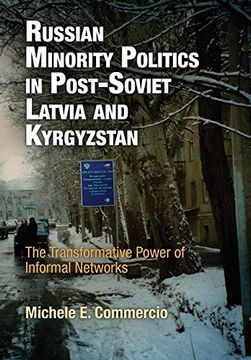Russian Minority Politics in Post-Soviet Latvia and Kyrgyzstan: The Transformative Power of Informal Networks (National and Ethnic Conflict in the 21St Century) (en Inglés)
Reseña del libro "Russian Minority Politics in Post-Soviet Latvia and Kyrgyzstan: The Transformative Power of Informal Networks (National and Ethnic Conflict in the 21St Century) (en Inglés)"
Russian Minority Politics in Post-Soviet Latvia and Kyrgyzstan The Transformative Power of Informal Networks Michele E. Commercio "The fate of Russian minorities in former Soviet republics has attracted considerable attention since the demise of the Soviet Union. In this book Michele Commercio offers an original contribution to the literature by focusing on the little-researched sphere of informal policies to argue that the degree to which official policies exclude ethnic minorities is in fact inversely related to their propensity to mobilize and seek redress."--Dominique Arel, University of Ottawa "Commercio is motivated by a genuine intellectual puzzle: why do ethnic Russians in Latvia (where the state pursues discriminatory policies against them) generally remain in the country, while their counterparts in Kyrgyzstan (where the state pursues less discrimination), generally emigrate to Russia? Her answer is at once elegant and well conceived; the difference lies in the stronger interpersonal networks among Russians in Latvia, compared to weaker ones among Russians in Kyrgyzstan."--Edward Schatz, University of Toronto The collapse of the Soviet Union suddenly rendered ethnic Russians living in non-Russian successor states like Latvia and Kyrgyzstan new minorities subject to dramatic political, economic, and social upheaval. As elites in these new states implemented formal policies and condoned informal practices that privileged non-Russians, ethnic Russians had to react. In Russian Minority Politics in Post-Soviet Latvia and Kyrgyzstan, Michele E. Commercio draws on extensive field research, including hundreds of personal interviews, to analyze the responses of minority Russians to such policies and practices. In particular, she focuses on the role played by formal and informal institutions in the crystallization of Russian attitudes, preferences, and behaviors in these states. Commercio asks why there is more out-migration and less political mobilization among Russians in Kyrgyzstan, a state that adopts policies that placate both Kyrgyz and Russians, and less out-migration and more political mobilization among Russians in Latvia, a state that adopts policies that favor Latvians at the expense of Russians. Challenging current thinking, she suggests that the answer to this question lies in the power of informal networks. After the fall of the Soviet Union, the Communist party, Komsomol youth organization, and KGB networks were transformed into informal networks. Russians in Kyrgyzstan were for various reasons isolated from such networks, and this isolation restricted their access to the country's private sector, making it difficult for them to create effective associations capable of representing their interests. This resulted in a high level of Russian exit and the silencing of Russian voices. In contrast, Russians in Latvia were well connected to such networks, which provided them with access to the country's private sector and facilitated the establishment of political parties and nongovernmental organizations that represented their interests. This led to a low level of Russian exit and high level of Russian voice. Commercio concludes that informal networks have a stronger influence on minority politics than formal institutions. Michele E. Commercio teaches political science at the University of Vermont. National and Ethnic Conflict in the 21st Century 2010 | 248 pages | 6 x 9 | 14 illus. ISBN 978-0-8122-4221-8 | Cloth | $59.95s | £39.00 ISBN 978-0-8122-0470-4 | Ebook | $59.95s | £39.00 World Rights | Political Science Short copy: Why do Russians choose to stay in Latvia, a state that adopts antagonistic policies that favor Latvians at the expense of Russians, yet migrate from Kyrgyzstan, a state that adopts accommodating policies to placate Kyrgyz and Russians? Michele E. Commercio suggests that the answer to this question lies in the power of informal networks.

